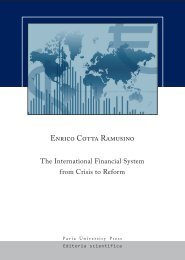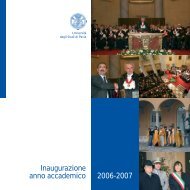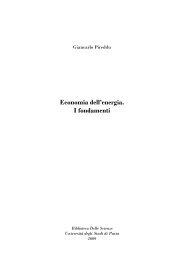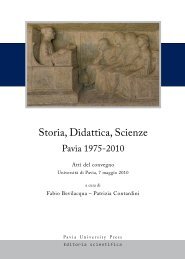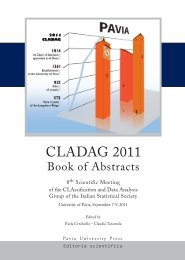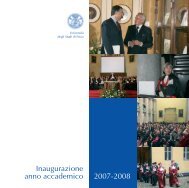The Palestinian Economy. Theoretical and Practical Challenges
The Palestinian Economy. Theoretical and Practical Challenges
The Palestinian Economy. Theoretical and Practical Challenges
You also want an ePaper? Increase the reach of your titles
YUMPU automatically turns print PDFs into web optimized ePapers that Google loves.
278<br />
Zagha<br />
In summary, what the data show is that that governments in developing countries are<br />
much more centralised than those in industrialised countries, <strong>and</strong> governments in the<br />
MENA region are even more centralised than the average for developing countries. Local<br />
government is a small part of total government <strong>and</strong> of national economic activity in the<br />
Middle East region. <strong>The</strong> <strong>Palestinian</strong> case shows an average pattern of the Middle East <strong>and</strong><br />
North Africa (MENA) region.<br />
4.1.8. Financing of the LGUs<br />
LGUs must have funds available to sufficiently meet their expenditure responsibilities.<br />
Within limits, LGUs should have control over user fees, tax rates <strong>and</strong> some tax bases.<br />
Typically, there are two main funding sources for LGUs: (1) self-generated revenues<br />
from taxes <strong>and</strong>/or user fees <strong>and</strong> (2) central government fund transfers, including any<br />
donor assistance. Revenue assignment to LGUs should help create an appropriate<br />
diversification of funding sources, while at the same time allow for the level of planned<br />
expenditures.<br />
<strong>The</strong> 1997 LGL leaves LGUs little or no control over the fees <strong>and</strong> taxes they can<br />
charge. <strong>The</strong> MoLG must ratify all such fees <strong>and</strong> taxes before they are put into effect. This<br />
destroys much of the ability of LGUs to match local preferences, capabilities <strong>and</strong><br />
willingness to pay. This centralised control by the MoLG also implies that the mix of<br />
taxes <strong>and</strong> fees is determined from top-down <strong>and</strong> takes no account of the unique<br />
social/political relationships that exist in each community. Finally, there is no provision<br />
in the law that requires LGUs to set user fees at a level that covers the cost of service or<br />
addresses the possibility of LGU insolvency. <strong>The</strong> types <strong>and</strong> weights of various funding<br />
sources utilised by <strong>Palestinian</strong> LGUs are shown in Table 4.





